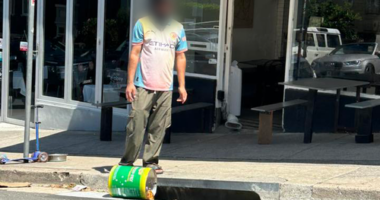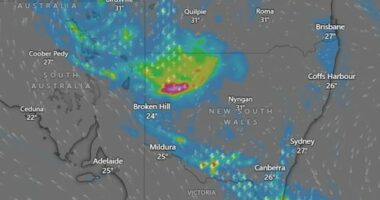Share this @internewscast.com

As the mid-morning sun shines over the Garma Festival site in Northeast Arnhem Land, the Garrtjambal auditorium buzzes with people finding their seats and finishing their coffee.
However, when Yothu Yindi Foundation CEO Denise Bowden steps onto the stage, the atmosphere becomes sharply focused.
The power of her words reverberates across the main forum.
Some in the crowd sit in quiet respect, others dab away tears as harsh realities are laid bare.
“Despite the success you observe here during your brief stay on Gumatj Country, you will leave a world still in crisis mode,” Denise Bowden stated during her address to the main forum on Saturday.
‘A destructive tide that keeps breaking’
Bowden has been the Chief Executive of the Yothu Yindi foundation and the director of the Garma Festival for years.
This year, the 25th anniversary of Garma Festival’s founding, she addressed one of the most pressing health issues of the region, rheumatic heart disease (RHD).
RHD is the most critical form of acquired heart disease in children and young adults living in developing countries.
Beginning as a bacterial infection on the skin or in the throat, if untreated it causes permanent damage to heart valves.
Despite that, RHD continues to disproportionately affect Aboriginal and Torres Strait Islander Peoples especially in remote regions.
Citing a 2018 study by Medical Journal of Australia, Ms Bowden said one in 10 young people in the nearby remote community of Maningrida live with RHD.
“That is the highest-ever recorded rate in the world for RHD,” Ms Bowden said.
“Not even in sub-Saharan Africa is there a higher rate of RHD.
“And it certainly does not exist in the non-Aboriginal community.
“Imagine if it did.”
NT incarceration second to El Salvador
Ms Bowden also highlighted the rapidly increasing rates of Indigenous incarceration in the Northern Territory, the highest in the country with over 1 per cent of its population incarcerated.
The incarceration rate in the Northern Territory is 1,238 per 100,000 people.
Worldwide, the NT is second only to El Salvador where the rate is 1659.
In Australia, the NT’s incarceration rate is three times greater than next worst, which is WA.
“This is a crisis that was decades in the making and is getting worse not better,” she said.
“We recognize that this issue stems from pervasive failures throughout government systems, and only by addressing these structural issues will the dysfunction leading to incarceration improve.”
A call to action
Though not shying away from some of the region’s harsh realities, Ms Bowden was also quick to praise the festival’s continuing legacy of achieving results for Yolngu people.
She encouraged attendees not to forget the area and its peoples when the tents are pulled down and the busses roll out.
“The Garma stamp is now an important part of the cultural, political and economic life of our great Australian nation,” Ms Bowden said.
“The heartbeat of Garma lies in the challenge to reconcile this past, with the reality of the present.
“Don’t leave Garma and put things on endless repeat. Don’t be fooled into thinking your attendance here is enough.
“Action is needed now.”














